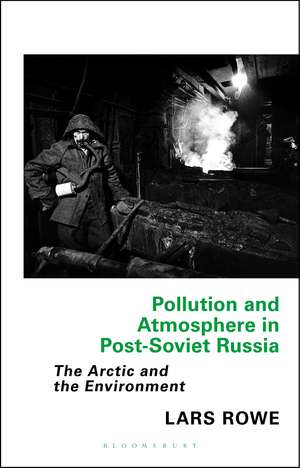Pollution and Atmosphere in Post-Soviet Russia: The Arctic and the Environment: Library of Arctic Studies
Autor Lars Roween Limba Engleză Paperback – 29 iun 2022
| Toate formatele și edițiile | Preț | Express |
|---|---|---|
| Paperback (1) | 196.89 lei 6-8 săpt. | |
| Bloomsbury Publishing – 29 iun 2022 | 196.89 lei 6-8 săpt. | |
| Hardback (1) | 567.65 lei 6-8 săpt. | |
| Bloomsbury Publishing – 9 dec 2020 | 567.65 lei 6-8 săpt. |
Preț: 196.89 lei
Nou
Puncte Express: 295
Preț estimativ în valută:
37.67€ • 39.55$ • 31.27£
37.67€ • 39.55$ • 31.27£
Carte tipărită la comandă
Livrare economică 11-25 aprilie
Preluare comenzi: 021 569.72.76
Specificații
ISBN-13: 9780755634897
ISBN-10: 0755634896
Pagini: 256
Dimensiuni: 138 x 216 mm
Greutate: 0.3 kg
Editura: Bloomsbury Publishing
Colecția Bloomsbury Academic
Seria Library of Arctic Studies
Locul publicării:London, United Kingdom
ISBN-10: 0755634896
Pagini: 256
Dimensiuni: 138 x 216 mm
Greutate: 0.3 kg
Editura: Bloomsbury Publishing
Colecția Bloomsbury Academic
Seria Library of Arctic Studies
Locul publicării:London, United Kingdom
Caracteristici
Offers a unique environmental perspective on the last years of the Soviet Union
Notă biografică
Lars Rowe is Senior Research Fellow at the Fridtjof Nansen Institute and Lecturer in Russian History at the University of Oslo.
Recenzii
Environmental negotiations with Russians have often been challenging and frequently unsuccessful. In his fine book, Lars Rowe reveals that Russian elites and even the public are not and feel no real reason to be concerned with environmental quality as a top priority. Unless that mindset is understood (or is changed), productive international engagement with Russia will falter. This is an insightful and relevant case study that deserves close attention.
For decades Norwegian and Russian officials sat on opposites of a table - and a border - negotiating how to deal with the dangerous Sulphur and heavy metal pollution of the Pechenganickel Mining and Metallurgical Combine on territory annexed by the USSR from Finland in 1944. Using archival documents, government reports and other sources Rowe considers how commercial, industrial, political and environment disagreements ultimately derailed efforts to modernize the factory and minimize pollution. Rowe covers a broad period - fifty years - and neatly manages to tell the stories of Soviet period developments, the impacts of the Gorbachev reforms, and efforts at environmental safety and security during the Yeltsin and Putin eras. In spite of decades-long negotiations and several bilateral agreements with Norway, as Rowe explains, neither Soviet nor today Russian officials could allow the protection of nature to stand in the way of production.
For decades Norwegian and Russian officials sat on opposites of a table - and a border - negotiating how to deal with the dangerous Sulphur and heavy metal pollution of the Pechenganickel Mining and Metallurgical Combine on territory annexed by the USSR from Finland in 1944. Using archival documents, government reports and other sources Rowe considers how commercial, industrial, political and environment disagreements ultimately derailed efforts to modernize the factory and minimize pollution. Rowe covers a broad period - fifty years - and neatly manages to tell the stories of Soviet period developments, the impacts of the Gorbachev reforms, and efforts at environmental safety and security during the Yeltsin and Putin eras. In spite of decades-long negotiations and several bilateral agreements with Norway, as Rowe explains, neither Soviet nor today Russian officials could allow the protection of nature to stand in the way of production.




